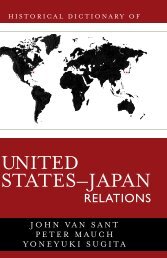Private Academies of Chinese Learning in Meiji Japan: The Decline ...
Private Academies of Chinese Learning in Meiji Japan: The Decline ...
Private Academies of Chinese Learning in Meiji Japan: The Decline ...
You also want an ePaper? Increase the reach of your titles
YUMPU automatically turns print PDFs into web optimized ePapers that Google loves.
240 PRIVATE ACADEMIES OF CHINESE LEARNING IN MEIJI JAPANaimed to spread education, but it was <strong>of</strong>ten the kangaku juku andnot just the new schools that gave people access to education.Likewise, the strengthen<strong>in</strong>g <strong>of</strong> national identity cannot beattributed to the modern schools alone. <strong>The</strong> kangaku curriculum,however varied its application <strong>in</strong> the different juku, represented acommon culture, and as more people received education <strong>in</strong> jukuor schools where they were taught by kangaku scholars, morepeople shared <strong>in</strong> that culture than previously. Not until theWestern civilization transmitted <strong>in</strong> the new schools had beenabsorbed by most <strong>of</strong> the population did kangaku lose this role.Even then Confucian ethics, assimilated <strong>in</strong>to the new nationalideology, constituted the basis <strong>of</strong> moral education <strong>in</strong> the newschools.Kangaku, which formed the core <strong>of</strong> what most juku taught, wastransformed <strong>in</strong> a similar way as the study <strong>of</strong> classics <strong>in</strong> Europe,from an amateur pursuit for those with capital and leisure to anacademic discipl<strong>in</strong>e among other discipl<strong>in</strong>es. At the same time(and aga<strong>in</strong> comparable to Europe) the position <strong>of</strong> kangakuchanged from be<strong>in</strong>g the source <strong>of</strong> all learn<strong>in</strong>g and the way toabsolute truths to be<strong>in</strong>g a field <strong>of</strong> study among others, wheremethods <strong>of</strong> textual criticism were applied to contextualize and todiscover true facts. 1 Education at the traditional juku, with itssynthesis <strong>of</strong> <strong>in</strong>tellectual and moral tra<strong>in</strong><strong>in</strong>g was closely related tothe former concept <strong>of</strong> kangaku. Thus the transformation <strong>of</strong>kangaku, which became manifest <strong>in</strong> the 1890s, the spread <strong>of</strong>modern schools and social changes caused juku to becomeobsolete.As we have seen, although juku education left its mark <strong>in</strong>different ways after the disappearance <strong>of</strong> the juku itself, the mostendur<strong>in</strong>g legacy is perhaps the way it is remembered and what Ihave called called the “juku myth” (Chapter 6). <strong>The</strong> idea <strong>of</strong> thejuku <strong>in</strong>spired and still <strong>in</strong>spires educational <strong>in</strong>itiatives anddebates. <strong>The</strong> warm relationships between teacher and studentsand the students themselves are contrasted with the cold, factorylikeatmosphere and the lack <strong>of</strong> attention to the <strong>in</strong>divdual <strong>in</strong>“mass-education”. Education <strong>of</strong> the whole person, <strong>in</strong>clud<strong>in</strong>gcharacter tra<strong>in</strong><strong>in</strong>g, is contrasted to the one-sided attention to<strong>in</strong>tellectual education and pass<strong>in</strong>g exam<strong>in</strong>ations to ga<strong>in</strong> worldlybenefits. Thus the image <strong>of</strong> the juku <strong>of</strong>fers an alternative withwhich to challenge the system <strong>of</strong> the day. Also, unlike thema<strong>in</strong> stream education system imposed on an <strong>in</strong>itially hostilepopulation, the juku is perceived as uniquely <strong>Japan</strong>ese.













